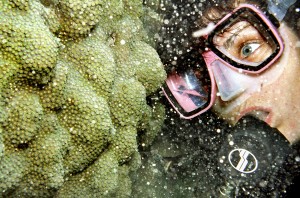
According to researchers, coral species utilize a reef-building and reproductive strategy by releasing millions of gametes once a year in synchronized mass-spawning rituals. The spectacular white excretion enables the eggs and sperm to enter the water in massive quantities, maximizing the chances of fertilization and overwhelming predators with more food than they can consume.
When egg and sperm unite, the resulting larval-stage “planula” ascends to the surface to drift in the current and grow. Eventually, within days or months, the planula settles to the bottom to grow into a polyp. The polyp then develops into a coral head by asexual budding, creating new polyps.
What triggers this fragile phenomenon remains unclear, though scientific observations indicate a strong connection between the coral spawn and seasonal lunar cycles as well as water temperatures, tidal and 24-hour light cycles.
Cultured corals, the result of wild transplant efforts by Key Largo’s Coral Restoration Foundation, also have been discovered spawning.
Though the polyp release cannot be guaranteed to happen on the exact date, this year full moons fall on Saturday, Aug. 13, and Sunday, Sept. 12. Divers can inquire with local dive operators about participating in scheduled coral spawning night dives on and around those dates.
Florida Keys diving: www.fla-keys.com/diving
Florida Keys visitor information: www.fla-keys.com or 1-800-FLA-KEYS
Social: www.facebook.com/floridakeysandkeywest • www.twitter.com/thefloridakeys • www.youtube.com/FloridaKeysTV
# # #